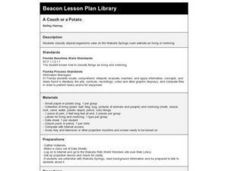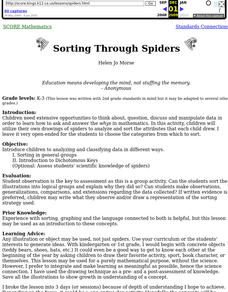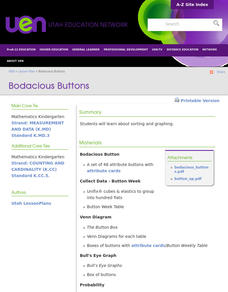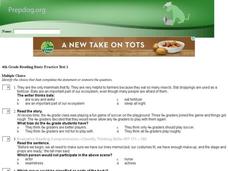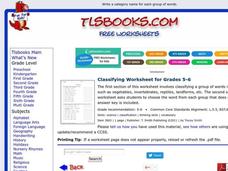Curated OER
What Is in a Rock?
Students identify, sort, and classify mineral samples that make up a common rock.
Curated OER
A Couch or a Potato
Students classify objects and organisms seen on the Wakulla Springs icam website as living or nonliving.
Curated OER
Sorting Through Spiders
Students utilize their own drawings of spiders to analyze and sort the attributes that each student drew.
Curated OER
Bodacious Buttons
First graders participate in games, graphing, and probability exercises to sort and graph buttons. They sort buttons with Venn diagrams and Bull's Eye graphs.
Curated OER
Sort Laboratory Practice
Eighth graders sort animals according to certain physical characteristics. In this science lesson, 8th graders explain the reason for such classification. They complete a worksheet individually at the end of the lesson.
Curated OER
Evaluative Reading Comprehension
In this reading learning exercise, learners answer multiple choice questions about reading lists, classifying, grouping sentences, and more. Students complete 20 problems.
Curated OER
Classifying and Sorting
In this English learning exercise, students add the suffix "ic". Students form adjectives by adding the suffix to nouns. Students choose the noun or adjective to complete the sentence.
Curated OER
Tree Trekkers
Students explore different types of trees. In this tree lesson, students use a digital camera to photograph trees in their area and upload them to a computer. Students will share their findings by using their photos to make a booklet or...
Curated OER
Classifying Dog Breeds
Learners research different dog breeds. In this classifying lesson, students gather information about dogs and classify them into different groups. Learners will classify the dogs into small, medium and large breed groups. Students...
Curated OER
Are You One of Us?
Students investigate how scientists sort and classify organisms. In this sorting and classifying lesson, students examine what systematics are as tools that scientists use. They examine images of invertebrates and sort them while stating...
Curated OER
Under The Sea
In this resource lesson, young scholars use non-fiction books to research ocean animals. Students discover the many features of non-fiction books and how to use these features to help them conduct research. Young scholars then categorize...
Curated OER
Sharing with Others (Private/Religious)
Students appreciate uniqueness and differences by comparing and contrasting fruit. In this differences lesson, students study fruits and analyze for similarities and differences. Students sort the fruit into five categories. Students...
Curated OER
Give it Back from a Snack
Students conduct and analyze a survey about snacks. In this graphing activity, students ascertain which snacks would be the best choice for the community. Students hold a sale and decide how the money could best be spent for the school...
Curated OER
Grouping Fruits and Vegetable
Students identify the differences between fruits and vegetables. For this nutrition lesson, students identify the properties of fruits and vegetables and group various fruits and vegetables into categories.
Curated OER
Sorting Objects
Students sort objects by color. In this classification lesson, students identify the color of the objects and categorize them according to color.
Curated OER
Sorting Through Life!
Pupils sort and count objects. In this sorting skills lesson, students work in small group with various objects that can be sorted and counted in groups.
Curated OER
Summer Machines Activity: Cool Tools
Students examine and think about various tools in their surrounding environment to facilitate development of their primary observation and sorting skills. In this tool observation lesson, students first sort a variety of tools any way...
Curated OER
Classifying
In this classifying worksheet, students read a list of four items. They identify the word that does not belong in the list. This one-page worksheet contains 12 classifying problems.
Curated OER
Putting Things in Place
For this classification worksheet, students read the words from the word box and then write them under the correct category of 'things that fly,' 'things that are hot,' or 'things that are soft.'
Curated OER
Classifying Pictures
For this classification worksheet, students examine four different pictures in a row. Students then circle the picture that does not belong with the other three.
Curated OER
Make a List
In this classification worksheet, 2nd graders make a list of objects that fly. Students study 7 pictures and list those that fly.
Curated OER
Classifying
In this classifying worksheet, students observe a group of words, analyze their similar characteristics and then give them a classification. Groups of words include items such as vegetables, reptiles, landforms, conifer trees,...
Curated OER
Fruit Or Vegetable? Sort the Cards
In this sorting worksheet , students color and cut 24 picture and word cards depicting different fruits and vegetables. Students sort the cards.
Curated OER
What Are They Doing?
In this sorting cut and paste worksheet, learners cut out 6 pictures of children engaged in household tasks. They paste these pictures in a house shaped puzzle, matching them to the correct verb phrase, ie, "washing the dishes."



